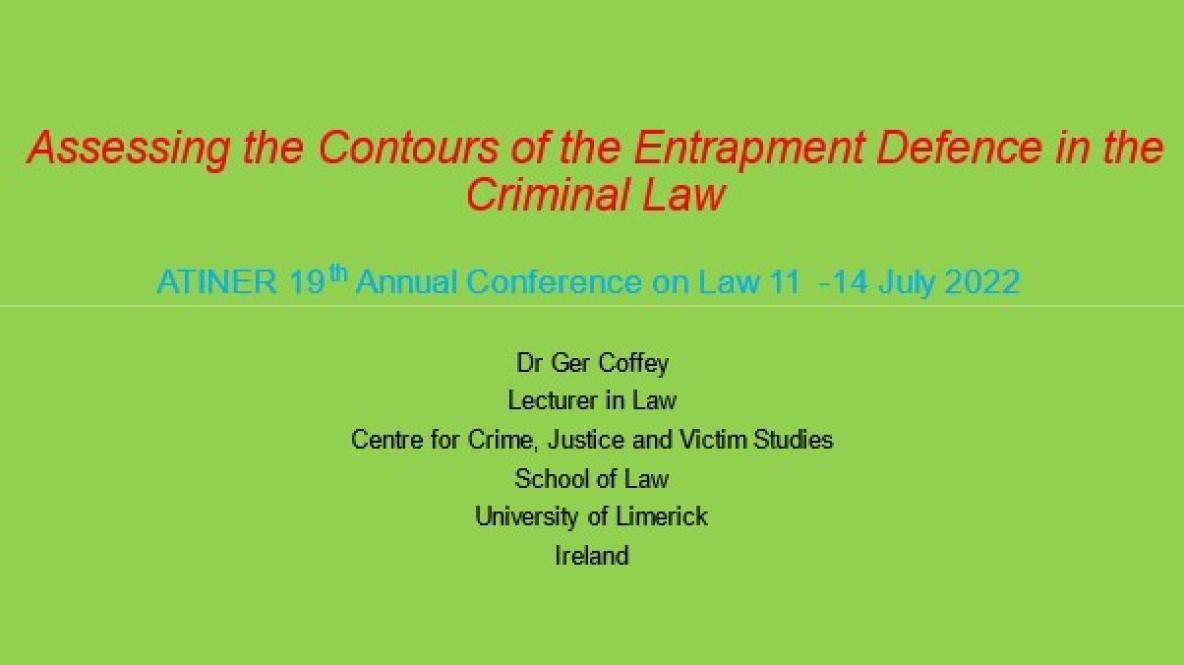

On Monday 11th July 2022, Dr Ger Coffey, Lecturer in Law and member of the Centre for Crime, Justice, and Victim Studies, presented a paper entitled ‘Assessing the Contours of the Entrapment Defence in the Criminal Law’ at the Annual International Conference on Law organised by the Athens Institute for Education and Research (ATINER), Athens, Greece.
The difficulties encountered by law enforcement agencies in the detection, investigation, and prevention of ‘consensual crime’ may necessitate the practice of undercover operations as an intelligence-led policing strategy. Consensual crime is not easily identifiable as it is unlikely that participants would report the offence to law enforcement authorities.
Undercover investigative techniques practiced by law enforcement agencies may be necessary and proportionate in the detection, investigation, and prevention of serious crime. Proactive intelligence-led investigative techniques employed by law enforcement officers to combat serious crime is an accepted practice and generally complies with human rights standards. The investigation of perceived criminal activity through undercover operations based on reasonable suspicion of guilt must be consistent with fundamental rights protections. Merely creating an opportunity or circumstances through passive intervention for suspects believed to be engaged in criminal behaviour to commit offences would not constitute entrapment. Unlike creating an opportunity through passive intervention, entrapment might be raised as a procedural defence where the law enforcement agent has incited or caused the commission of an offence with the intention that the suspect would be prosecuted.
The inherent power of the courts to prevent an abuse of process and stay criminal proceedings, or exclude unlawfully obtained evidence, may be necessary to preserve the integrity of the criminal justice process and uphold the rule of law (which requires laws to be accessible, intelligible, clear, and predictable with legal certainty and avoidance of arbitrariness). The role of the courts in reviewing allegations of entrapment is to balance competing interests. The public interest in the detection, investigation and prevention of crime sometimes yields to the practicalities of the means necessarily employed during undercover operations, which must be balanced with fundamental constitutional due process and ECHR fair trial rights. There must be clear, adequate, and formal oversight mechanisms delimiting undercover operations to safeguard the integrity of the criminal justice process and the rule of law. It is a truism that ends do not justify the means employed in the investigation of crime and apprehension of suspects. Moreover, the complexities associated with the investigation of consensual crimes can has the potential to blur the line between creating the opportunity (legitimate infiltration) and causing (incitement) the commission of an offence.
The paper evaluated the common law procedural entrapment defence in comparative perspective with reference to seminal jurisprudence from major common law jurisdictions, and relevant ECtHR jurisprudence, which provided an interpretative analysis on evidential and procedural issues raised with the defence.
The conference provided a unique opportunity to meet, hear and learn from distinguished experts, legal professionals, and academics from around the world. The exchange of ideas and constructively critical feedback on the hypothesis presented greatly informed the paper that will be published by Professor David Frenkel (Ed.), Anthology of Law (2022).
Dr Coffey greatly acknowledges the financial support received from the AHSS Faculty Research Committee to facilitate the presentation of this research paper.
Email: ahss@ul.ie
Phone: +353-61-202700
Postal Address: AHSS Faculty Office, University of Limerick, Limerick, Ireland.